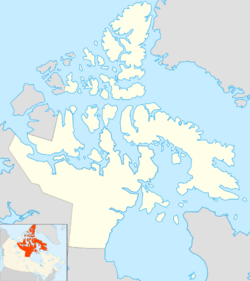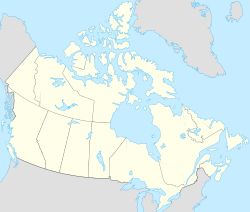Stupart Island facts for kids
| Geography | |
|---|---|
| Location | Arctic Ocean |
| Coordinates | 77°08′00″N 104°25′30″W / 77.13333°N 104.42500°W |
| Archipelago | Findlay Group Queen Elizabeth Islands Canadian Arctic Archipelago |
| Administration | |
|
Canada
|
|
| Territory | Nunavut |
| Region | Qikiqtaaluk |
| Demographics | |
| Population | Uninhabited |
Stupart Island is a small, uninhabited island located far north in Canada. It is part of the amazing Canadian Arctic Archipelago, a huge group of islands in the Arctic Ocean. This island is found in the territory of Nunavut.
Stupart Island is known for being a remote and untouched part of the Arctic wilderness. It is a place where nature rules, with no people living there permanently.
Contents
Where is Stupart Island?
Stupart Island is located in the cold waters of the Arctic Ocean. It lies to the south-east of Lougheed Island. It is also west of another island called Edmund Walker Island.
This island is part of a smaller group of islands known as the Findlay Group. The Findlay Group itself is part of an even larger collection of islands. These are the Queen Elizabeth Islands, which are a major part of the Canadian Arctic Archipelago.
The Findlay Group
The Findlay Group is a cluster of islands in the Arctic. Stupart Island is one of the islands in this group. These islands are all very remote and are not home to any permanent human settlements. They are important for understanding the geography of the High Arctic.
The Queen Elizabeth Islands
The Queen Elizabeth Islands are a large group of islands in the Canadian Arctic. They are named after Queen Elizabeth II. This group includes many large and small islands, like Stupart Island. These islands are mostly covered in ice and snow for much of the year. They are known for their extreme cold and unique Arctic wildlife.
Why are Arctic Islands Important?
Even though Stupart Island is uninhabited, Arctic islands like it are very important. They play a key role in the global climate system. The ice and snow on these islands reflect sunlight, which helps to keep the Earth cool.
These islands are also home to special plants and animals that have adapted to the harsh Arctic environment. Scientists often study these remote areas to learn more about climate change. They also learn about how wildlife survives in extreme conditions.
Life in the Arctic
While Stupart Island itself is small and remote, the wider Arctic region supports unique life. Animals like polar bears, seals, and various seabirds live in the Canadian Arctic. They depend on the sea ice and cold waters for their survival. The plants that grow here are tough and low to the ground. They can handle the freezing temperatures and short summers.



